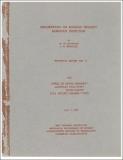Description of boiling project burnout detector
Author(s)
Raymond, M. W.; Reynolds John Mitchell
DownloadHTL_TR_1957_011.pdf (3.265Mb)
Other Contributors
Massachusetts Institute of Technology. Division of Sponsored Research.
Massachusetts Institute of Technology. Heat Transfer Laboratory.
Metadata
Show full item recordAbstract
Introduction: In order to effectively utilize the high heat flux available through the mechanism of nucleate boiling in forced convection heat transfer, it is of primary importance that the maximum flux or "burnout" conditions be known for the liquid under consideration. It is a characteristic of the boiling heat transfer process that, as attempts are made to exceed the burnout heat flux, the conditions at the heat transfer surface become such that the heat transfer coefficient decreases with increasing temperature difference between the wall and fluid. If the apparatus in which this process occurs is not of the type in which a constant temperature is imposed, another equilibrium point will be reached at a significantly higher wall temperature. In the case of water at pressures of atmospheric and higher, the wall temperature assumed in the new equilibrium state is high enough to cause failure in all but the most conservatively designed apparatus. Because of the unstable nature of the boiling process beyond the maximum vs. temperature difference on the q/A vs. L T curve, once the burnout temperature difference is exceeded, small power reductions will not save the heat exchanger from the major portion of the incipient temperature jump. Power must be reduced to a relatively low level to insure that excessive temperature will not be developed in the equipment. The time in which this power reduction must be accomplished depends on the particular flux and the heat capacity of the system being used; however, in most practical cases, this time can be expected to be extremely short.
Date issued
1957Publisher
Cambridge, Mass. : M.I.T. Heat Transfer Laboratory, [1957]
Other identifiers
14135743
Series/Report no.
Technical report (Massachusetts Institute of Technology, Heat Transfer Laboratory) ; no. 11.
Keywords
Boiling-points., Detectors.